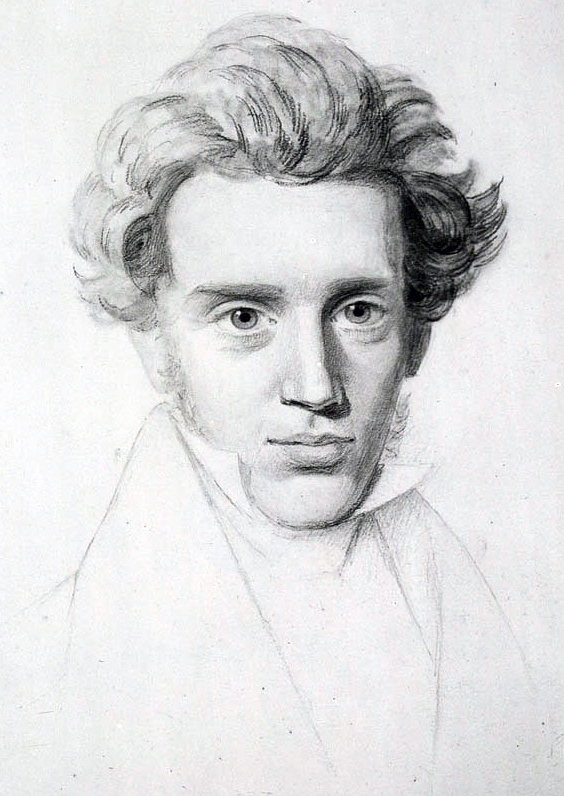Frases célebres de Søren Kierkegaard
Frases de vida de Søren Kierkegaard
“Vivir en el recuerdo es el más perfecto modo de vida que se puede imaginar.”
Fuente: Ortega Blake (2013). En Google Books. https://books.google.cat/books?hl=es&id=QJIAVIKP1dgC&q=Kierkegaard#v=snippet&q=Kierkegaard&f=false Consultado el 23 de diciembre de 2019.
Frases de fe de Søren Kierkegaard
Fear and Trembling
Søren Kierkegaard Frases y Citas
“Dejemos con toda libertad a los sabios el privilegio de no contradecirse nunca.”
/ "Dejemos con toda tranquilidad a la gente sabia el orgullo de no caer nunca en contradicción."
Fuente: Diario de un seductor
Søren Kierkegaard: Frases en inglés
Fuente: 1840s, Sermon Preached at Trinitatis Kirke, 1844, P. 173
Soren Kierkegaard, For Self-Examination, Hong p. 67
1850s, For Self-Examination (1851), Christ is the Way
Fuente: 1850s, Attack upon Christendom (1855), p. 97
Stages on Life's Way, p. 161-162
1840s, Stages on Life's Way (1845)
Fuente: 1840s, Two Ethical-Religious Minor Essays (1849), p. 95
Swenson, 1959, p. 27
1840s, Either/Or (1843)
Preface
1840s, Fear and Trembling (1843)
The Present Age and of the Difference Between a Genius and an Apostle, translated by Alexander Dru (1962)
1840s, Two Ages: A Literary Review (1846)
Of The Difference Between A Genius And An Apostle, Alexander Dru translation 1962 p. 89
1840s, Two Ethical-Religious Minor Essays (1849)
“Out of love, God becomes man. He says: "See, here is what it is to be a human being."”
Fuente: 1840s, The Sickness unto Death (July 30, 1849), p. 161
Søren Kierkegaard, Eighteen Upbuilding Discourses, Hong p. 37
1840s, Upbuilding Discourses (1843-1844)
Fuente: 1840s, Three Discourses on Imagined Occasions (1845), p. 48
Upbuilding Discourses in Various Spirits, Hong p. 12
1840s
Søren Kierkegaard, Upbuilding Discourses in Various Spirits, Hong p. 327
1840s, Upbuilding Discourses in Various Spirits (1847)
1850s, Two Discourses at Friday Communion (August 1851)
Fuente: 1840s, Sermon Preached at Trinitatis Kirke, 1844, P. 162
Johannes Climacus (1841) p. 80-81
1840s, Johannes Climacus (1841)
Shudder; for if you do not, you are implicated in it.
Fuente: 1850s, Attack upon Christendom (1855), p. 122
Fuente: 1840s, Three Discourses on Imagined Occasions (1845), p. 83
Fuente: 1850s, Attack upon Christendom (1855), p. 121
Journals and Papers X4A 435
1840s, The Journals of Søren Kierkegaard, 1840s
“The question is asked in ignorance, by one who does not even know what can have led him to ask it.”
Preface
1840s, Philosophical Fragments (1844)
Attack Upon Christianity, The Instant, No. 7, Søren Kierkegaard, 1854-1855, Walter Lowrie 1944, 1968
1850s, Attack upon Christendom (1855)
Fuente: 1840s, Two Ethical-Religious Minor Essays (1849), P. 90-91
“Irony is a qualification of subjectivity.”
1840s, On the Concept of Irony with Continual Reference to Socrates (1841)
“Source: Without Authority by Soren Kierkegaard, Hong 1997 P. 145ff”
1850s, An Upbuilding Discourse December 20, 1850
Fuente: 1840s, Two Ethical-Religious Minor Essays (1849), p. 57
1850s, Judge For Yourselves! 1851 (1876)
Fuente: 1850s, Practice in Christianity (September 1850), p. xii
